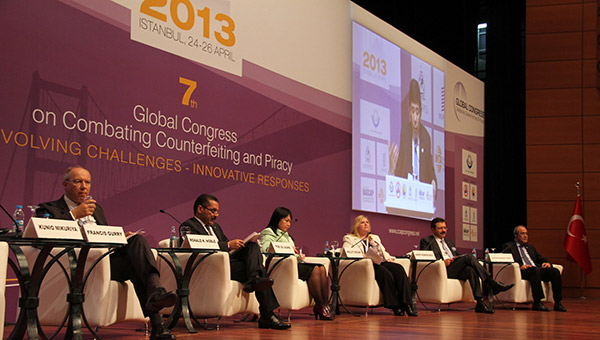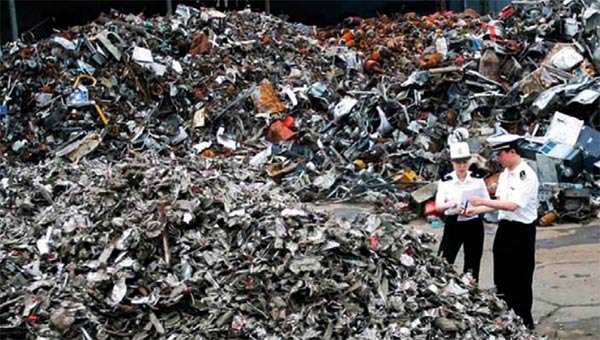Building Respect for IP: Cooperation with Partners
Since a wide range of actors influences international and national intellectual property (IP) policies in the area of building respect for IP, we maintain close relationships with numerous partner organizations.
Building respect for IP is a cross-cutting topic to which multiple organizations contribute. Our collaborations are motivated by the desire to ensure policy cohesion and achieve maximum impact through shared resources. Additionally, through our collaborations we aim to guide the debate on the protection and enforcement of IP rights to ensure it progresses in a balanced direction, combining enforcement and the prevention of infringements.

Events
International Conference on Building Respect for IP
Bringing together senior representatives from government and private businesses, the Conference allowed participants to share experiences of how IP can stimulate innovation and drive development and growth. In addition, it reaffirmed the shared commitment to build respect for IP, by exchanging information on enhancing public awareness about the importance of respecting IP.
November 17-18, 2016. Shanghai, China.
Global Congress on Combatting Counterfeiting and Piracy
Convened by a public-private partnership, the Global Congress brings together high-level key players to pool their experience and thereby enhance international coordination and cooperation. The aim is to develop more effective solutions in pursuit of the common goal of building respect for IP and combating counterfeiting and piracy.
Participants typically include government officials, business leaders, senior law enforcement officials, judges and lawyers, intergovernmental and non-governmental organizations, consumer groups, and academics.
Тopics and issues
We cooperate with our partners on a wide range of topical issues of global relevance.
Cоunterfeit goods
Counterfeiting impacts most industries, ranging from luxury to consumer goods, affecting products as diverse as automotive replacement parts, electrical appliances and toys. The socio-economic effects of the manufacture and trade in counterfeit goods go beyond the interests of IP owners and affect consumers and society at large.
Through the unauthorized use of registered trademarks, the producers of counterfeit goods falsely claim that their product is of the same make and quality as the genuine product manufactured by the trademark owner. While consumers may believe they are buying a genuine product, in reality there is no connection between the product and the trademark owner.
Counterfeit medicines are an important case in point. While they infringe trademarks and may thus lead to confusion on the side of consumers, there is also a high risk that counterfeit medicines do not meet the same pharmaceutical specifications and quality standards as the genuine product, and they may pose a serious threat to the health of unaware patients. The counterfeiting of medicines therefore also relates to the bigger problems of pharmaceutical crime and consumer health.
WIPO paper on counterfeit medecines
This paper, promoted at an INTERPOL Conference, looks at the specific legal meaning of “ counterfeiting” and analyzes the ways in which balanced IP enforcement mechanisms can mitigate the risks posed by counterfeit medicines. It also outlines WIPO’s activities in this important area at the intersection of IP and public health.

Roundtable
In 2011, recognizing the multi‑dimensional challenge in addressing counterfeit medicines and the multiplicity of actors involved, WIPO initiated the Multi-Stakeholder Roundtable on Technical Assistance Against Counterfeit Medicines. This annual event brings together intergovernmental and non-governmental international organizations active in providing technical assistance in the area of counterfeit medicines. In addition it serves as a forum for the exchanging of information and perspectives, as well as discussing practical areas of synergy and cooperation between participating organizations, which include INTERPOL, WCO, WHO and WTO.
The discussions at the Roundtable demonstrate that counterfeit medicines are a multi-faceted problem, which can only be tackled with the cooperation of all stakeholders. In this sense, the Roundtable has contributed to the quality, effectiveness and balance of technical assistance on offer in this area.
Awareness raising
WIPO provides factual and unbiased information about the risks associated with counterfeit goods, as well as the mechanisms available to mitigate these risks.
An important part is raising awareness of the basic function of trademark law and the public interest objectives it seeks to achieve, as well as remedies for trademark infringement.
IP and private international law
Thanks to globalization, ever-closer economic integration, and fast-moving digitization, challenges surrounding the interaction between IP and private international law are inevitably becoming ever more frequent and acute. IP infringements routinely impact on multiple territories, resulting in questions of jurisdiction, applicable law and enforcement and recognition of foreign judgments.
IP rights are territorial. This means that they are protected through national or regional legislation, and within defined territorial borders. Yet IP assets are of a global character and their usage is not limited by territorial boundaries. To form a factual and practical overview of the approaches taken by courts in addressing the interaction of private international law and IP, WIPO collected information on court judgments addressing “private international law issues in online IP infringement with cross-border elements”. The data was analyzed and the resulting report is now available for download.
In addition, WIPO is collaborating with the Hague Conference on Private International Law on the joint publication of a practical Guide Addressing the Intersection Between IP Law and Private International Law.

Find out more
- Private International Law Issues in Online Intellectual Property Infringement Disputes with Cross-Border Elements
- WIPO-ILA Seminar on IP and Private International Law
- The work of the Hague Conference on Private International Law in relation to the enforcement of IP Rights
Environmentally safe disposal of IP-infringing goods
Every day customs authorities from around the globe detect and seize IP infringing products, such as counterfeit and pirated goods. Given the sheer volume of IP-infringing goods, the storage and disposal of infringing material poses significant logistical challenges.
As it is often unclear whether IP-infringing goods contain harmful or hazardous substances, the disposal of this material in an environmentally safe way can be costly and require specialized facilities, expertise and collaboration with stakeholders.
We have organized several dedicated workshops in collaboration with the United Nations Environment Program (UNEP) that have addressed the disposal of IP-infringing goods from both the IP and the environmental perspective, bringing together government officials from both fields..
ACE discussions
- At the 12th session of the ACE in 2017, independent environmental specialist Dr. Martin Guard proposed a Study on the Environmentally Safe Disposal and Destruction of IP Infringing Goods (WIPO/ACE/12/3 Rev.), describing the specific environmental and public health concerns in relation to four specific types of IP infringing goods and identifying challenges and opportunities. In addition, Italy and Mexico shared their National Experiences with the Environmentally Safe Disposal of IP infringing goods (WIPO/ACE/12/4).
- Study relating to Existing Methods of Disposal and Destruction of Counterfeit Goods and Pirated Goods within the Asia Pacific Region (WIPO/ACE/6/8)
- Storage and Destruction - Recycling Facility in the Netherlands (WIPO/ACE/5/7)

